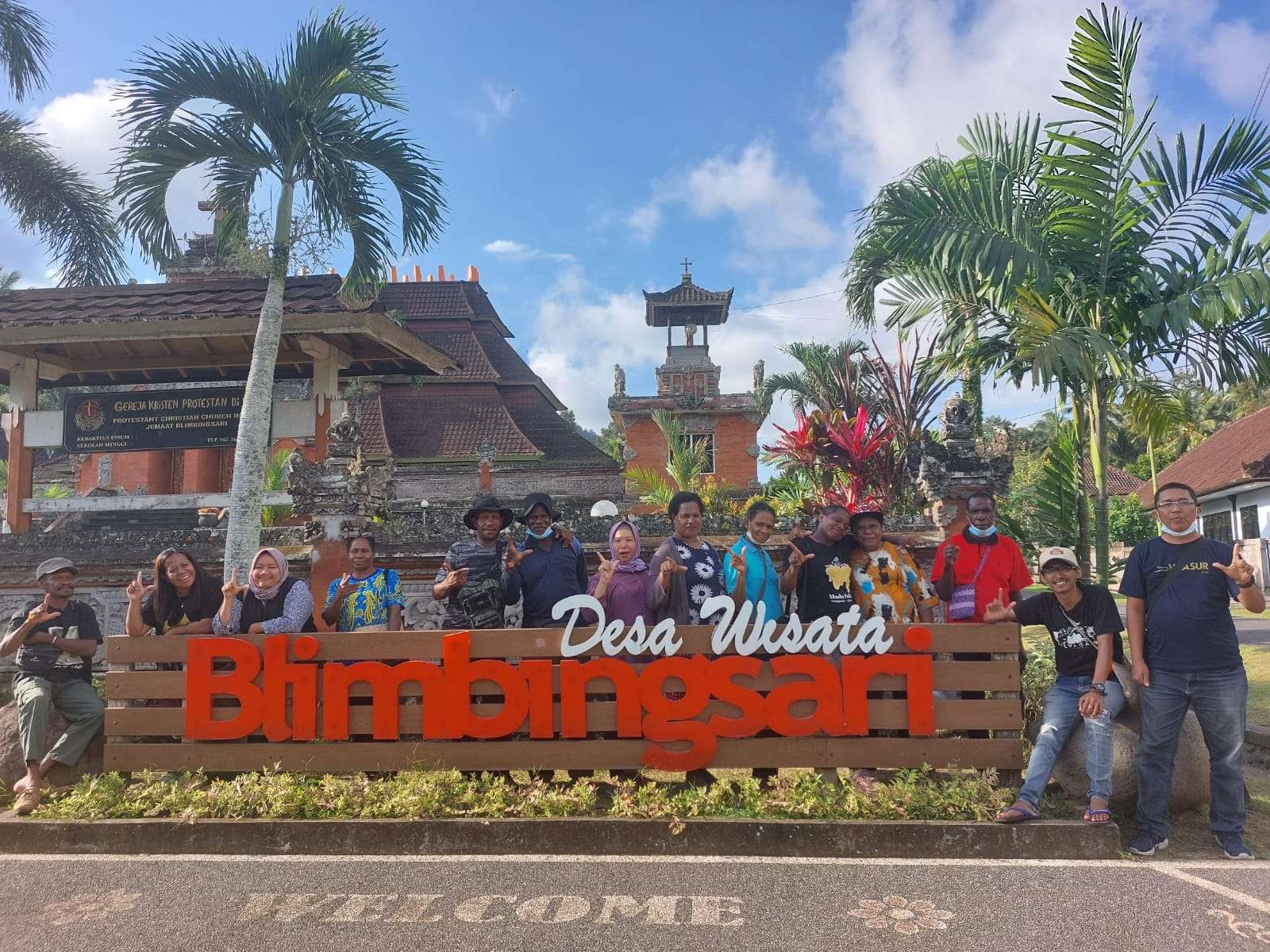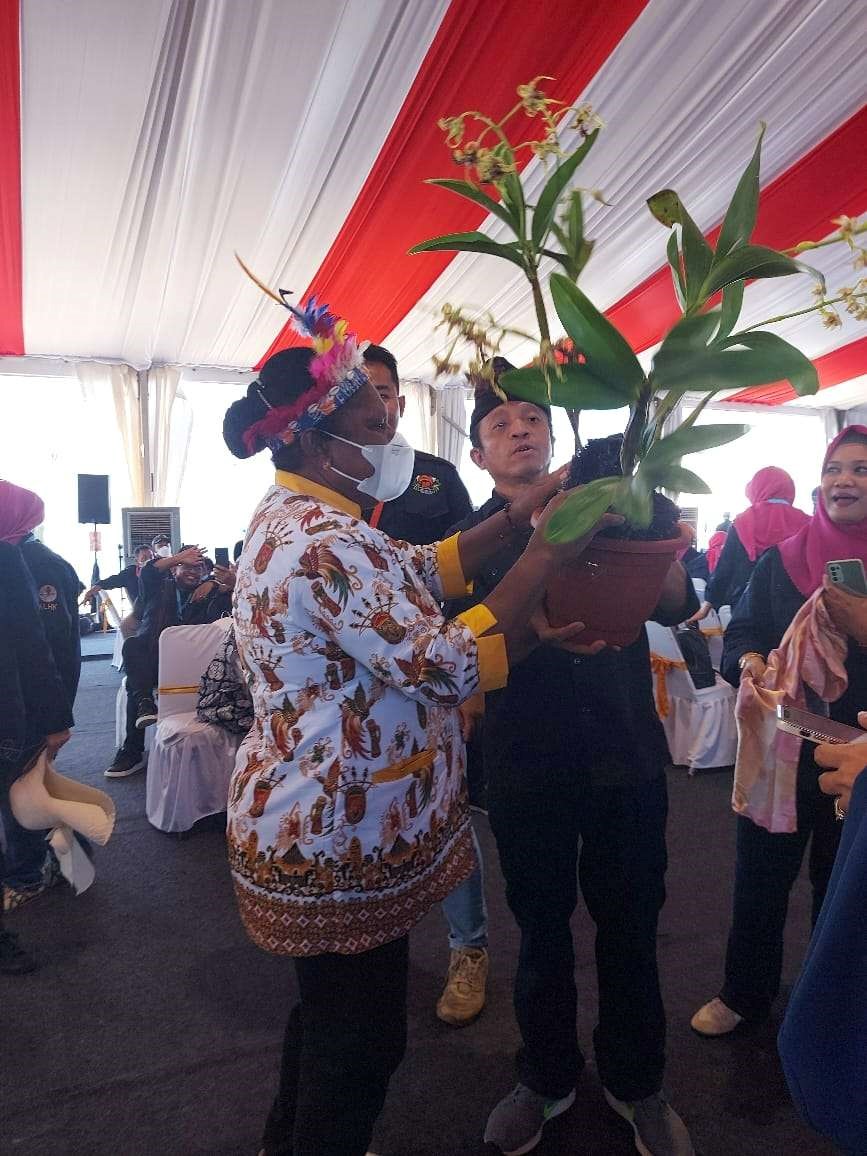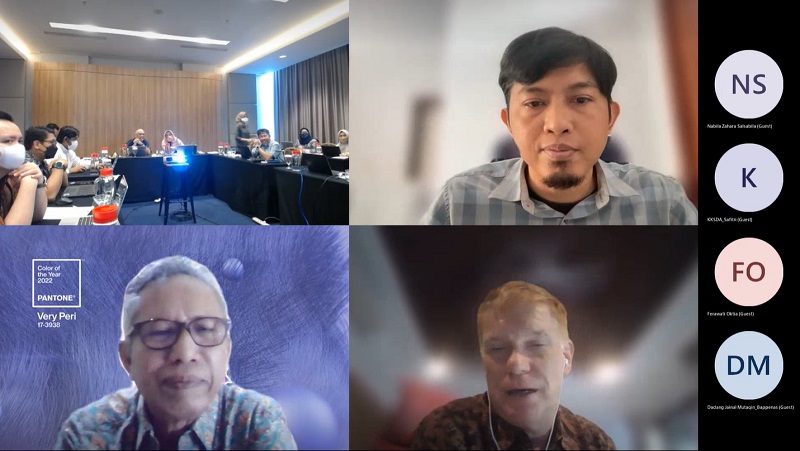FORCLIME
Forests and Climate Change ProgrammeTechnical Cooperation (TC Module)

Select your language

In an effort to share experiences and to also motivate Forest Farmers Groups (KTH) operating within Papua in terms of their efforts to develop ecotourism, the Papua Natural Resources Conservation Center (BBKSDA) and the Wasur National Park, working in conjunction with FORCLIME, recently arranged a visit for KTH from the villages of Tablasupa, Dosai, Maribu, Pasir 6, Yanggandur and Wasur to the Blimbingsari Tourism Village in Jembrana Regency, Bali. The visit, which took place on September 3, 2022, was one of the events associated with the exhibition that was recently organized in order to celebrate National Nature Conservation Day, which was this year held in the West Bali National Park.
During the study visit, participants were accompanied by Mr. Nana Rukmana, a village facilitator from the National Park of Bali Barat. The group was also warmly received by Mr. I Made John Ronny, the Perbekel (the local name for village head) of Blimbingsari at the Blimbingsari Village Office.
Blimbingsari Village is a tourism village organized through community-based management. No hotels or restaurants may operate in this village. Instead, all tourism-related services, including guesthouses and meals, are provided by the local village community. With assistance from the Bali Barat National Park, Blimbingsari Village has become a popular place for the breeding of Bali starlings (Leucopsar rothschildi). These Bali starlings are bred from captivity but are ultimately returned to nature and this is one of the activities that attract visitors to the village. In addition, Blimbingsari Tourism Village offers cross-country tour packages that allow visitors to enjoy the natural beauty and cultural uniqueness of the area while observing Bali starlings. This popular tourist village also offers a camping ground that can be rented by visitors.
Blimbingsari is also known for its spiritual element and Balinese traditions are here acculturated into the lives of the villagers, who primarily adhere to the Christian faith. This aspect of the village has also become a tourist attraction and the iconic village church building features elements of Balinese architecture. Moreover, the rituals and methods of worship here reflect Balinese traditions, including the use of the traditional Balinese gamelan in order to provide a musical accompaniment during the services that are held in the church.
During the meeting, Mr. Made explained that the development of tourism in this village was being fully supported and assisted by both the village government and Village-Owned Enterprises (BUMDes).
The villagers here are also highly skilled in the area of waste management. Indeed, as one enters the gateway to the village, one is immediately struck by how neat and clean it all looks. Waste is separated by every household and also sold through the local waste bank. Public awareness of the importance of sanitation is taught in the schools here, while religious leaders also play a role in relation to this issue through sermons that they deliver in the church.
During the study visit, KTH Papua discussed the village with the Head of Blimbingsari, who explained how the visitors could manage such a group, the support of the village for the group and the booking system for tour packages. One of the most interesting lessons learned during the visit was the sharing of results among the community, as well as the fact that retribution for the Bali Barat National Park and BUMDes is arranged through an application. This means that when tickets are ordered by guests, the relevant retribution is directly and transparently distributed to each of the parties concerned.
“I am very happy to have been involved in this activity and it has inspired and motivated me to develop ecotourism in Tablasupa. The village of Tablasupa has potential similar to that of the village that I visited in Bali, however, the management and awareness of the group in Tablasupa still need to be improved. Hopefully, with assistance from BBKSDA and FORCLIME, the ecotourism that is being developed in Tablasupa can improve in the future,” explained Orpa Kisiwaytouw from the Tablasupa Nature Lovers Group.
For more information, please contact:
Theodora F. Resubun, Advisor for Sustainable Forest Management and Coordinator for Papua Province
Mohammad Sidiq, Strategic Area Manager for Sustainable Forest Management and Coordinator for Papua and West Papua Provinces

The Natural Resources Conservation Center (BBKSDA) in Papua and the Wasur National Park in conjunction with FORCLIME facilitated a number of Forest Farmers Groups (KTH) from the villages of Tablasupa, Dosai, Maribu, Pasir 6, Yanggandur and Wasur to attend the 2022 National Nature Conservation Day (HKAN) celebration. This annual event is organized by the Ministry of Environment and Forestry and was this year held in West Bali National Park from 31 August to 2 September 2022 under the theme Amertha Taksu Abhinaya, which means restoring nature for a prosperous society. The event was opened by the Minister of Environment and Forestry and encompassed a wide agenda which included talk shows and exhibitions in which national parks and conservation centers from all over Indonesia participated.
At the Wasur National Park booth, the attending KTH displayed various non-timber forest products (NTFPs) produced in the villages of Wasur and Yanggandur. Among the products on display were teh sarang semut (herbal tea made from Myrmecodia pendans), trigona bee honey, minyak buah merah (oil made from Pandanus conoideus), virgin coconut oil, eucalyptus oil, candlenut oil, shredded snakehead fish and snakehead fish crackers. In addition, orchids cultivated by community groups from the villages of Wasur and Dosai were also on display. Various types of orchids were exhibited at the Wasur National Park booth, including leopard orchids (Grammatophyllum sp), frizzy orchids (Dendrobium spectabile), Dendrobium johannis and Antenantum orchids, among other species on show. The representative from the village of Dosai, Ms. Agustina Kwano, handed over the Dendrobium spectabile to the Secretary-General of the Ministry of Environment and Forestry (KLHK), Dr. Bambang Hendroyono.
During the HKAN celebration, representatives of community groups also participated in talk shows and gained insights and inspiration from conservation activists who acted as resource staff during the event. Ms. Ida Ayu Rusmarini, a 2020 Kalpataru awardee, was one of these staff members and shared information and inspirational tales of how she first started to engage in the cultivation of medicinal plants and rare plants. In addition, the assisted community groups present at the event also shared information and experiences with other exhibitors who are also engaging in the development of NTFP products and environmental services.
Representatives from the assisted community groups also participated in various field trips as part of a series of events that were organized in order to celebrate this year's HKAN. The locations visited during these trips are breeding grounds for the Bali Starling (Leucopsar rothschildi) in West Bali National Park. The community group representatives also visited a number of ecotourism sites on the islands of Menjangan and Menjangan Plataran, which are being managed by the private sector. During these visits, community representatives, particularly those from the villages of Tablasupa, Pasir 6 and Wasur who are currently engaged in the development of ecotourism, offered their enthusiastic participation and engaged in productive discussions with ecotourism managers and community facilitators from West Bali National Park.
“I would like to thank FORCLIME because through this visit I was able to check out NTFP products produced by other groups from various regions and could also engage these groups in helpful discussions. This has increased my level of motivation and I’m now keen to develop products other than the orchids that I have been working on to date,” enthused Ms. Agustina Kwano, a representative from the village of Dosai.
For more information, please contact:
Theodora F. Resubun, Advisor for Sustainable Forest Management and Coordinator for Papua Province
Mohammad Sidiq, Strategic Area Manager for Sustainable Forest Management and Coordinator for Papua and West Papua Provinces

With its extensive tropical forests, Indonesia has huge biodiversity and bioeconomy potential and the country’s forest bioeconomy has the potential to contribute significantly to other sectors of the economy, such as energy, food and pharmaceuticals. However, awareness of various stakeholders and research relating to the forest bioeconomy remains limited. As a result, the Ministry of National Development Planning/Bappenas has initiated a study aimed at optimizing the forest bioeconomy for long-term use.
Against this background, FORCLIME facilitated a kick-off meeting for the study, which was held on 19 August 2022 in Sentul, West Java. The meeting was opened by Dr. Nur Hygiawati Rahayu, ST, MSc, the Director of Forestry and Water Resources Conservation at Bappenas, and continued with a number of presentations made by experts from the Bandung Institute of Technology. During the discussion, various bioeconomy potentials that will be capable of supporting the transition from a fossil-based economy to a bio-resource-based economy were discussed. Research and the use of technological innovations in order to increase the added value of forest products are seen as important areas of exploration. In addition, the availability of comprehensive data relating to Non-Timber Forest Products, both upstream to downstream, is also seen as critical.
In September, a series of discussions with related parties will be held and will involve participation from academics, related ministries/institutions, state-owned enterprises, NGOs and the private sector.
“We hope that this study can provide an overview of how to utilize the potentials of Indonesia's forests through an analysis of the current situation in Indonesia, including conditions at the site level, regulations and funding. We will draw up a projection of requirements for the next 20 years and hopefully, the results of this study can provide input for the National Long-Term Development Plan 2026 - 2045,” Mrs. Nur Hygiawati Rahayu explained.
For more information, please contact:
Nurdita Rahmadani, Junior Advisor for Monitoring, Evaluation and Reporting
Pipin Permadi, Senior Advisor and Liaison Officer
Wandojo Siswanto, Strategic Area Manager for Forest Policy and Climate Change


